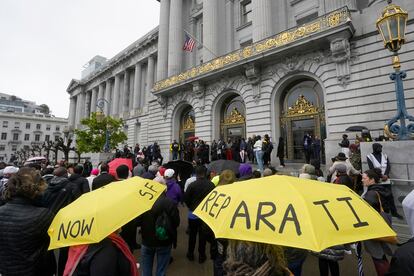California unveils ambitious first-in-nation slavery reparations package
A set of 14 bills that were two years in the making aims to correct centuries of racism in a state with 2.6 million African Americans, but the initiative will face an uphill battle in the state legislature


After years in the making, a group of California lawmakers has presented a long-awaited, one-of-a-kind proposal to repair the historical harm caused by slavery. The initiative consists of an ambitious package of 14 measures covering topics as diverse as the prison system, compensation for land expropriation, the elimination of obstacles for entrepreneurs with criminal records and even discrimination over hairstyles at sports competitions. There is one big absence, however: the package does not include an earlier proposal for cash payments to descendants of slaves.
The bills were unveiled on Thursday by the nine lawmakers who formed a task force to investigate how the state should respond to centuries of injustice. This group was created in 2020 by Governor Gavin Newsom after the murder of George Floyd at the hands of a Minneapolis police officer.
For two years and in various hearings throughout the state, the group listened to hundreds of testimonies about how racism impacted family stories. California outlawed slavery in its 1849 Constitution, but the move did not come with penalties to punish slave owners, so the practice continued.
The task force’s progress was closely followed by politicians, academics, economists and historians due to the possible national repercussions that its conclusions could have. Other states such as Colorado, New York and Massachusetts have also set up groups, but have not yet attempted to turn the recommendations into law. In May, the California task force delivered its final conclusions in more than 1,600 pages containing 111 recommendations that the legislative branch must now consider.
“We will endeavor to right the wrongs committed against Black communities through laws and policies designed to restrict and alienate African Americans,” said Assemblymember Reggie Jones-Sawyer, one of the members of the task force, in a statement. “These harms are found in education, access to homeownership, and to capital for small business startups, all of which contributed to the denial of generational wealth over hundreds of years.”
The bills seek, for example, to restrict solitary confinement in prisons due to the effects it can have on mental health. A similar initiative was presented last year but failed to secure approval in the state legislature. Newsom vetoed another similar measure in 2022.
Only one of the initiatives involves cash payments to people affected by racism. The proposal by California Senator Steven Bradford would restore to its original owners the ownership of land that was expropriated during segregation. The way the proposal is written, affected individuals would be entitled to financial compensation.
Bradford’s proposal drastically reduces the potential number of beneficiaries in a state with 2.6 million African Americans. Media attention focused for months on the amount that the members of this racial minority, 5% of the state’s population, might receive. The task force narrowed the proposal and voted to set requirements. Only those who could directly trace their lineage to the days of Jim Crow, and whose ancestors immigrated before 1900, would be entitled to compensation.
Some economists who advised the task force estimated that the total cost of the measure would be around $500 billion, according to the most conservative numbers. That figure was much higher than the annual state budget of around $297 billion.
The members of the task force estimated that a Black resident of California would receive about $2,352 annually as compensation for police persecution and overrepresentation of African Americans in the prison population between 1971 and 2020. Another calculation provided $3,366 to people in Black neighborhoods to compensate for years of racism by banks and institutions that denied them loans between 1930 and 1970. The reduction in life expectancy made them eligible for $13,619 for each year of residence in California. In this way, a 70-year-old Black Californian could expect to receive up to $1.2 million.
Governor Newsom, who is dealing with a budget shortfall over the next few years, does not believe that reparations should be about money. In an interview with Fox News last year, the governor said that the task force’s goal was not to sign checks, but rather to correct systemic injustices and that this could be addressed in different ways.
Assemblywoman Lori Wilson on Thursday said that it is a mistake to associate reparations with “direct cash payments.” “The true meaning of the word repair involves many more things,” said the legislator, who chairs the California Legislative Black Caucus. The bills still face an uphill battle to become law.
Sign up for our weekly newsletter to get more English-language news coverage from EL PAÍS USA Edition
Tu suscripción se está usando en otro dispositivo
¿Quieres añadir otro usuario a tu suscripción?
Si continúas leyendo en este dispositivo, no se podrá leer en el otro.
FlechaTu suscripción se está usando en otro dispositivo y solo puedes acceder a EL PAÍS desde un dispositivo a la vez.
Si quieres compartir tu cuenta, cambia tu suscripción a la modalidad Premium, así podrás añadir otro usuario. Cada uno accederá con su propia cuenta de email, lo que os permitirá personalizar vuestra experiencia en EL PAÍS.
¿Tienes una suscripción de empresa? Accede aquí para contratar más cuentas.
En el caso de no saber quién está usando tu cuenta, te recomendamos cambiar tu contraseña aquí.
Si decides continuar compartiendo tu cuenta, este mensaje se mostrará en tu dispositivo y en el de la otra persona que está usando tu cuenta de forma indefinida, afectando a tu experiencia de lectura. Puedes consultar aquí los términos y condiciones de la suscripción digital.








































